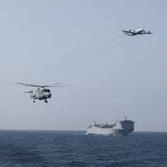While the full story of the Arab uprisings -- and in particular the Libya chapter -- has yet to be written, sea power has thus far seemed curiously absent from the events of the Arab Spring. Although one Libyan warship apparently bombarded rebel positions in Tripoli and another may have defected, maritime power has not been central to the course of that country's revolution. Similarly, the Egyptian navy played no meaningful role in overthrowing Hosni Mubarak, and now remains at dock for lack of funding.
And what of NATO? In theory, the effort to relieve Libya and manage the chaos that has engulfed North Africa should be an easy call for the major Mediterranean naval powers. Navies have an almost unique ability to deploy influence and power in short order, especially in coastal areas. To be sure, there has been a Mediterranean response, but it has seemed languid given the massive potential for revolutionary change onshore in North Africa. The ability of European navies to respond has been hamstrung by general force reductions, a trend symbolized by the last mission of HMS Cumberland, a Royal Navy frigate destined for decommissioning that was sent to rescue British nationals from Libya a few days ago. Until very recently, the United States Navy has been almost entirely absent from the scene.
In fact, the most notable naval deployment of the last two weeks has been the transit of two Iranian warships through the Suez Canal en route to Syria. This move signaled alarm to Israel, which expressed concern about what the deployment portended for Iranian influence in the Mediterranean. However, the long-term relevance of the mission remains uncertain. Egypt cannot legally bar the warships of a non-belligerent country from using the Suez Canal, and the Iranian warships have breached no international law. Indeed, Raymond Pritchett has argued that the Iranian deployment amounts to a "communications exercise," designed to elicit over-reaction from Israel and the United States. Nevertheless, concerns remain that the cargo carried by one of the warships might include weapons destined for Hezbollah.

